
Table of Contents
Player fees, sponsorships, balancing budgets— oh my. No one said managing a sports team’s finances would be easy.
As a regular, non-accountant person like yourself, taking care of club finances can be tedious and leave room for error. Plus, who wants to chase up unpaid league fees constantly?
The solution: a sports team accounting software to streamline finances and free up your time. Read on to learn about the top options based on features, capabilities, and price.
Features to look for in a sports club accounting software
Every youth sports organization might prioritize different features based on their needs. Overall, here are some to look for when choosing a sports team accounting software:
- Online Payment Processing: To handle membership fees, ticket sales, and other transactions efficiently.
- Invoicing and Billing: For sending out dues and payment reminders.
- Financial Reporting: To generate income statements, balance sheets, and other financial reports for informed decision-making.
- Budgeting and Forecasting: To manage and plan the club's financial future.
- Expense Tracking: To keep track of operational costs, equipment purchases, and other expenses.
- Integration Capabilities: The ability to integrate with other tools like registration systems, CRM, etc., can streamline processes.
- Fund Accounting: Especially important for nonprofit sports teams to track funds separately.
- Ease of Use: A user-friendly interface that non-accountants can navigate.
- Security Features: To keep sensitive financial data safe.
- Customer Support: Prompt and effective assistance when needed.
- Multi-user Access: Allows different organization members to access and work on the financial data as required.
The best sports team accounting software compared
1. Jersey Watch

Jersey Watch is a leading sports team management software that provides a basic overview of your finances. Jersey Watch has received overwhelmingly positive customer reviews, with a rating of 4.9 out of 5 stars across multiple sources. Most users have given it a 5-star rating, accounting for 91% of all reviews, while 8% have given it a 4-star rating.
With Jersey Watch, you can sign up athletes online and collect payments via debit or credit card directly through the platform. You can track payments to understand your financial health, plan a youth sports budget, and make more informed decisions.

For example, in your Deposits report, you can see details like
- Dollar Amount
- Players in each deposit
- Any transaction fees
- Estimated arrival of future deposits
- Any refunds you issued
You can also manage and organize player and volunteer data efficiently, including maintaining contact information, tracking participation, organizing teams, and more. By consolidating all athlete, parent, and volunteer information in one place, it becomes much easier to manage a youth sports league. You can also make payment plans for families on a budget.
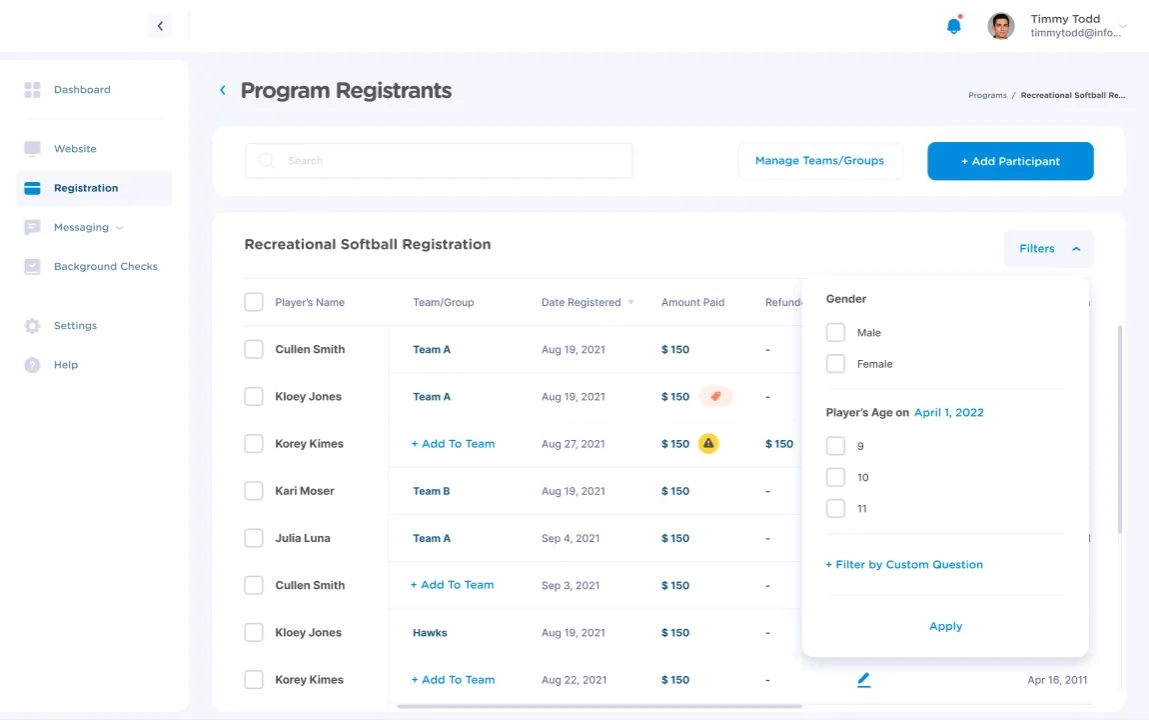
Jersey Watch's built-in communication tools can be valuable in managing payments. You can send out automated reminders for due payments, provide updates about registration fees, and inform members about any payment policy or procedure changes. This ensures that everyone stays informed and payments are made on time.
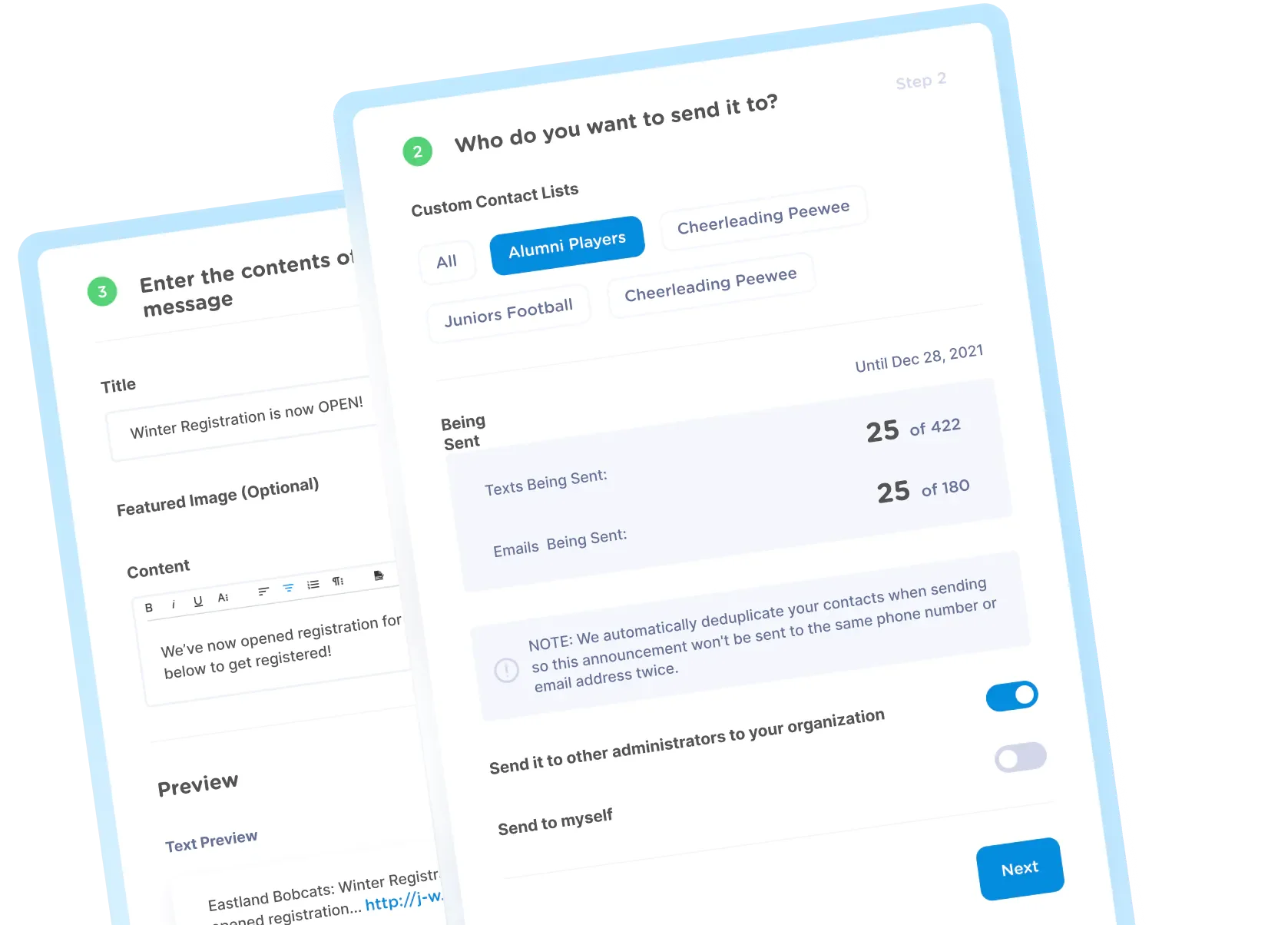
If you need more advanced accounting features, many customers use QuickBooks alongside their Jersey Watch account.
Features:
- Online registration
- Payment tracking
- Sponsorship management
- Basic financial reporting
- Integrated communication tools
Pros:
- Automates youth sports management tasks and saves time
- Simple-to-use software
- Highly rated customer service
- Excellent value for money
Free trial: You can create a free account, and pay to activate your account and start collecting payments
Pricing: Starts at $29 per month
2. MoneyMinder
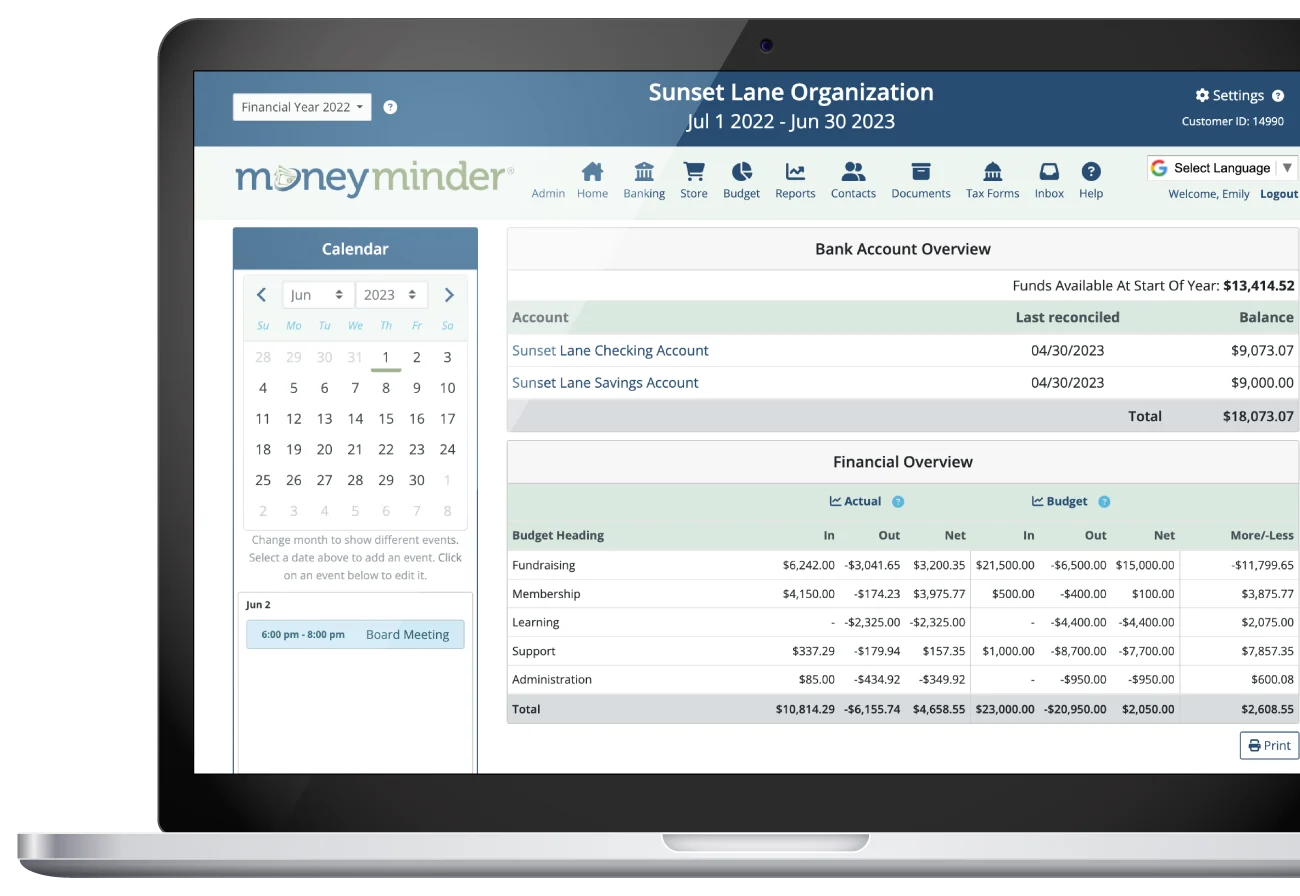
Source: MoneyMinder
MoneyMinder is a cloud-based accounting software designed to assist small to large non-profit organizations and sports clubs with bookkeeping, budgeting, and reporting.
It’s helpful for youth sports leagues, whether you’re managing the books for a little league or a travel basketball team. MoneyMinder is easy to learn and use, and offers features like bank reconciliations, document storage, membership management, goal setting, and role-based permissions.
People who use MoneyMinder have generally positive reviews, praising its ease of use and exceptional customer support. The software has an overall rating of 4.9 out of 5 stars, according to G2, with 83% of users giving it a 5-star rating.
Overall, they appreciate the high-level accounting features accessible even to those without an accounting background.
Features:
- Bank account reconciliation
- Member, volunteer, and donor tracking
- Budget development
- Report generation
- Tax calculation
- Document storage
- Integrates with PayPal, Square, Stripe, and Venmo
- Syncs with over 12,000 different banks
Pros:
- Easy to use.
- Outstanding customer support
- Good value for money
- Free version available
Cons:
- No mobile app
- Search function could be improved
Free trial: 30 days.
Price: $179 per year.
3. Clubtreasurer
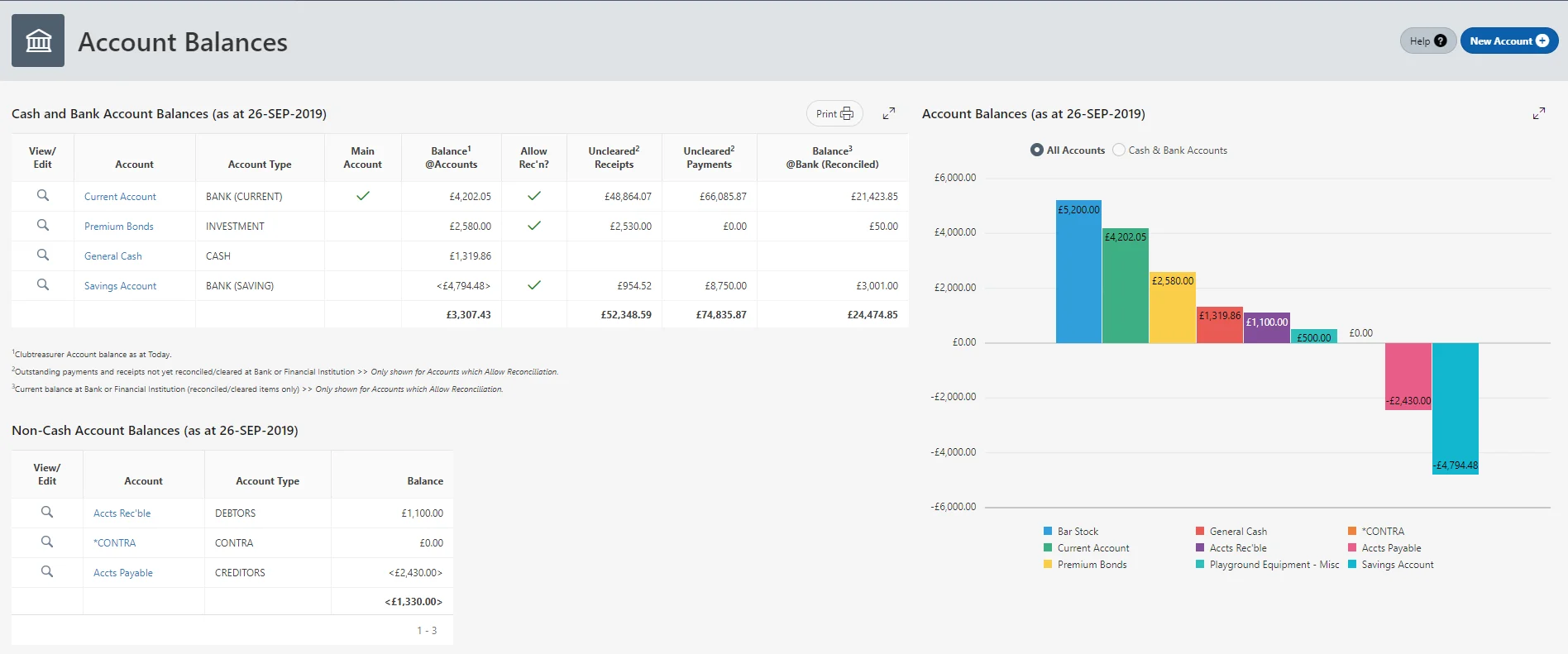
Source: Clubtreasurer
Clubtreasurer is a low-cost and easy-to-use accounting software for small organizations, clubs, and charities. It helps you manage cash flows, account balances, budgets, funds, and activities all in one place.
Clubtreasurer offers basic income and expense tracking. You can create different expense categories and add them to your options as expenses occur. The reports are simple; you can generate them with a click in PDF or CSV format.
It also helps you manage club members in a secure database. You can set up your system to create memberships and joining fees, track and record payments, and keep up with balances due. Overall, Clubtreasurer is a good no-frills accounting app for small teams to manage finances.
Features:
- Cash flow management
- Activity and expense tracking
- Funding pools
- Planning and budgeting help
- Membership management
- Comprehensive library of reports
Pros:
- Easily understand team finances at a glance
- Simple set up
- Cost-effective
Cons:
- Som reviews report a clunky interface
- No tax preparation help
Free trial: 30 days.
Price: Paid plans start at roughly $6.50 per month.
4. Quickbooks
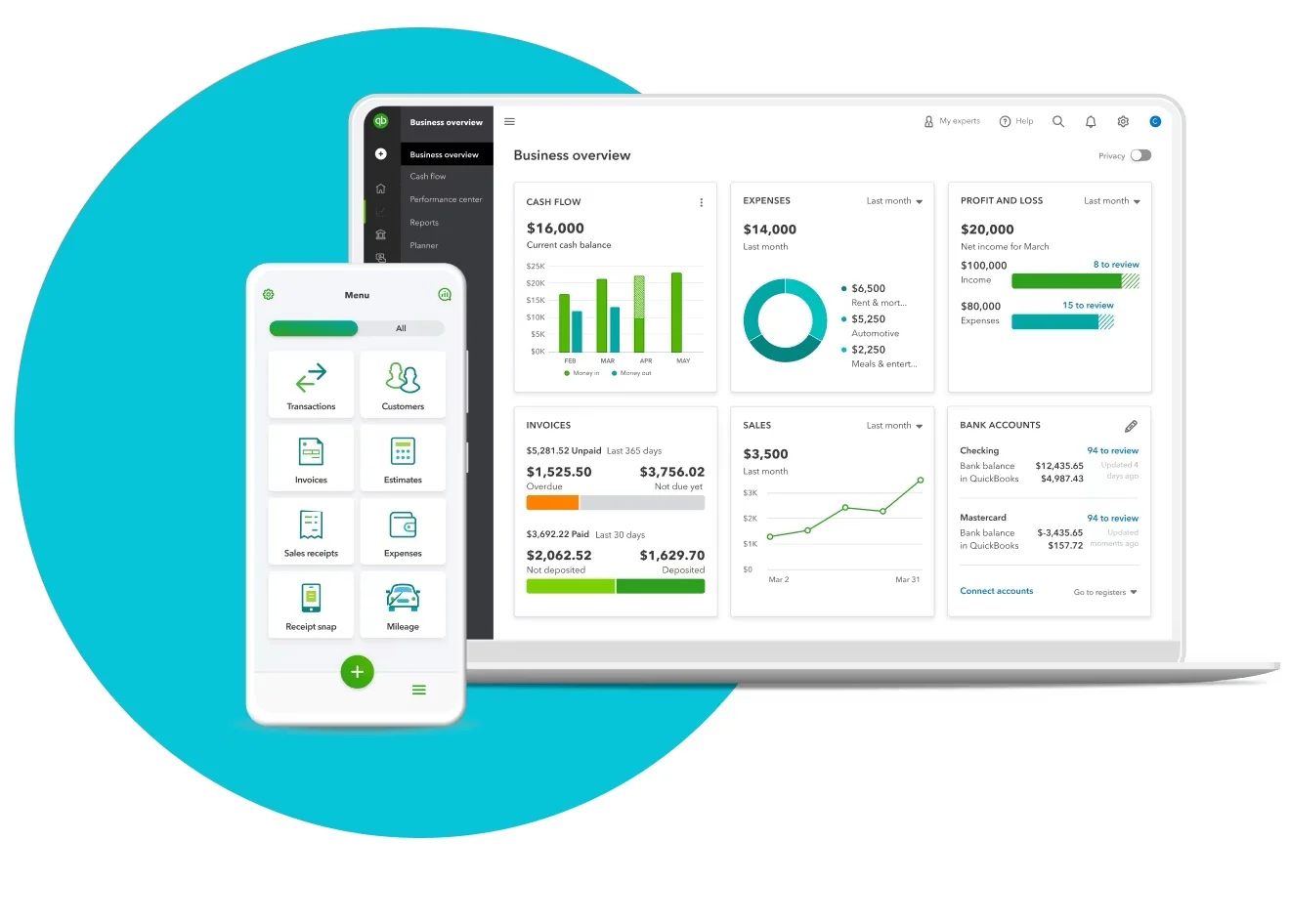
Source: QuickBooks
QuickBooks is a popular small business accounting software that helps manage income and expenses, generate reports, and prepare taxes. While it's not built specifically for youth sports teams, it's popular because of its features.
With QuickBooks, you can easily manage expenses in one place. You can get a full view of your bank feeds on desktop and mobile. It also offers a task management feature to track what work needs to be done and when.
Backed by the multi-billion dollar brand, Intuit, QuickBooks has become known for its user-friendly interface, appreciated by both regular folks and advanced accountants.
Features:
- Expense tracking
- Accounting reports
- Cash flow management
- Payroll support
- Tax preparation
- Mileage tracking
- Online payments
- Multi-user access
- Time tracking
- Bank reconciliation
- Automated backup
- Data security
Pros:
- User-friendly
- Robust feature list
- Integrations with over 750 business and nonprofit tools
Cons:
- Lacks sports-specific features
- Limited reports outside of accounting
Free trial: 30 days.
Pricing: $9 per month.
5. Aplos
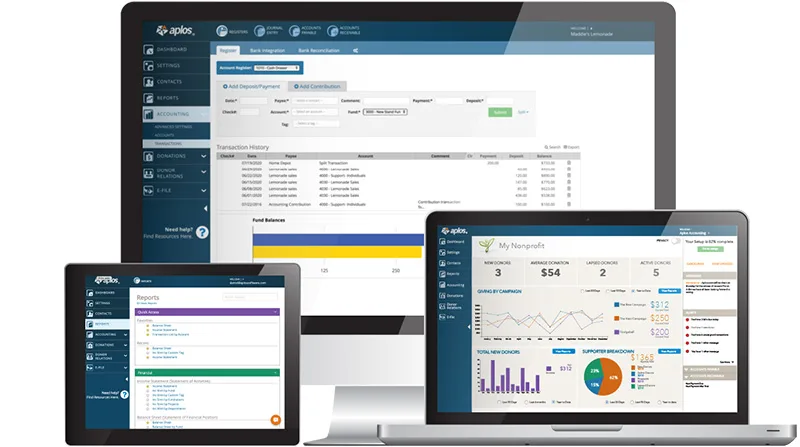
Source: Aplos
Aplos is a highly-rated accounting software for medium to large sports clubs and organizations, with an average rating of 4.5 out of 5 stars across various sources. It offers many features like fund accounting, online donation tools, and donor database management.
Aplos offers good budgeting options, including tag-based dimensions to manage overall budget and smaller, project budgets. You also get access to good reporting features, including income statements, balance sheets, donation reports, and more. Plus, you can customize reports and save them for future use.
If you upgrade your account, you can get year-end audit and tax prep features. The most basic plan is normally good for the average sports club.
Features:
- Fund accounting
- Budget management
- Financial reporting
- Accounts Payable/Receivable
- Bank reconciliation
- Fixed asset tracking
- Donor management
- Event registration
- Customizable Chart of Accounts
Pros:
- Easy to use
- Great customer service
- Donor management tools
Cons:
- Custom reports are hard to create
- Expensive for small clubs
Free trial: 15 days
Pricing: $99 per month
VIDEO: Best User-Friendly Accounting Software for Youth Sports Organizations
Create your accounting system today
Youth sports accounting has a ton of moving parts. Too much for the average administrator and manager. That’s why you want a workflow that does the heavy lifting for you and keeps your finances organized.
Jersey Watch is an excellent choice if you want sports management software with basic accounting functions for fundraising and payments. If you need more, QuickBooks or another option from the list above works well too.
Sports accounting software FAQ
How do you maintain sports club accounts?
Maintaining sports club accounts involves keeping track of membership fees, sponsorship funds, and operational expenses. A few ways to do this are to use accounting software, conduct regular audits, and follow proper accounting rules. You should definitely have a treasurer on your board who helps with finances and reports at each meeting to the rest of your board members.
Why is software needed for sports club accounting?
Sports club accounting software automates and streamlines financial processes, minimizes human error, and accurately tracks income and expenses. Aside from that, it's easy to generate financial reports so that you can make informed decisions.
What is the best accounting software for sports clubs?
Sports clubs should choose accounting software based on their specific needs. However, platforms like QuickBooks are popular for their robust features. Sports management platforms like Jersey Watch can also provide basic financial management features.
What are the benefits of using a sports accounting software?
Sports accounting software simplifies financial management by automating tasks, improving accuracy, and providing real-time insights. Also, it helps with budgeting and forecasting, and it saves time by reducing manual work.